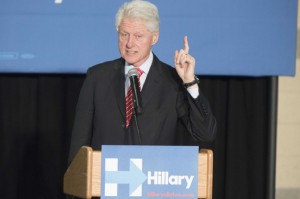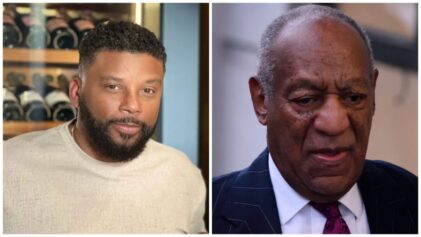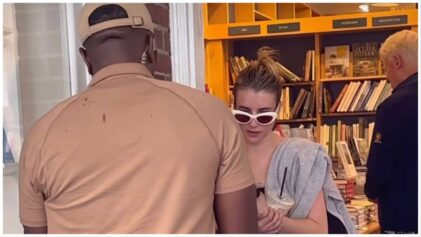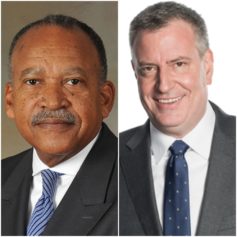Former President Bill Clinton was on the campaign trail this week, and when confronted by #BlackLivesMatter activists for his crime policies as president, he went off script. It was a sight to behold. And it was a reminder why Black folks got mad at him back in 2008, when he made statements disrespectful to Black people.
Clinton was in Philadelphia stumping for his wife and presidential candidate Hillary Clinton on Thursday, when Black protesters interrupted his event and condemned him for his 1994 Violent Crime Control and Prevention Act, which led to the mass incarceration of Black people.
As Reuters reported, several protesters heckled Clinton and held up signs, including one that read: “CLINTON Crime Bill Destroyed Our Communities.” One person held up a sign that read, “Hillary is a murderer,” according to the Huffington Post, while another yelled that the candidate should be tried for “crimes against humanity.”
Hillary Clinton has come under fire for a video from 1996, in which she defended the 1994 crime legislation, and calls youth in gang members “super-predators” who must “be brought to heel.” In the face of protesters who have confronted her for her remarks, the former Senator and Secretary of State apologized and said she regretted her past statement. The Democratic frontrunner, Clinton has sought to shore up Black support by embracing the language of the #BlackLivesMatter movement and enlisting the support of Black mothers who have lost children to police violence.
President Clinton helped smooth things over for his wife’s 2016 run by apologizing for mass incarceration. “I signed a bill that made the problem worse,” he said at the NAACP annual convention in Philadelphia last July. “And I want to admit it.”
“We had gang warfare on the streets. We had little children being shot dead on the streets who were just innocent bystanders standing in the wrong place,” he added. “In that bill, there were longer sentences. And most of these people are in prison under state law, but the federal law set a trend,” Clinton noted. “And that was overdone. We were wrong about that. That percentage of it, we were wrong about. ”
And yet, once again in Philadelphia a year later, all of that seemingly went out the window for the former president, who spent his time talking down to Black people and defending policies that warehoused Black bodies and in the process, destroyed Black communities and decimated Black families.
“Here’s the thing. I like protesters, but the ones that won’t let you answer are afraid of the truth,” Clinton said at Thursday’s rally. “Hillary spent her time trying to get healthcare for poor kids—and who were they? Their lives matter.”
Further, Clinton touted the benefits of his crime bill. “I had an assault weapons ban in [my version of the bill],” he said. “I had money for inner-city kids, for out of school activities, we had 110,000 police officers so we could put people on the street, not in these military vehicles, and the police would look like the people they were policing.” Moreover, Clinton argued that Republicans would not pass the legislation without more sentencing measures. “I talked to a lot of African-American groups — they thought black lives mattered,” he continued. “They said, ‘Take this bill, because our kids are being shot in the street by gangs. We have 13-year-old kids planning their own funerals.’”
Bill Clinton managed to defend his wife’s “super-predators” remarks, and accuse Black activists of coddling criminals and supporting murderers, a common tactic of #BlackLivesMatter opponents. “I don’t know how you would characterize the gang leaders who got 13-year-old kids hopped up on crack and sent them out into the street to murder other African American children. Maybe you thought they were good citizens—she didn’t.”
“You are defending the people who killed the lives you say matter. Tell the truth,” Clinton added. “The reason they know it’s true is [the protesters] won’t hush. When somebody won’t hush and listen to you, that ain’t democracy. They’re afraid of the truth. Don’t you be afraid of the truth.”
Then there was the icing on the cake: “I’ll tell you another story about a place where Black lives matter: Africa,” the former president told the crowd.
Suddenly, Black people were reminded of the 2008 election cycle, when Bill Clinton, once again stumping for Hillary, said some things that offended Black folks. “Jesse Jackson won South Carolina in ’84 and ’88. Jackson ran a good campaign. And Obama ran a good campaign here.” he said to reporters in Columbia, S.C. on Jan. 26, 2008, as Politico reported. The comment was viewed by Black voters as a racially insensitive snub against Obama, in a highly racially charged environment in which the Clintons faced charges of racebaiting and white entitlement.
Meanwhile, if we are to believe that Bill Clinton meant everything he said this week in Philly, then we must also believe that his apology at the NAACP confab last year was a ruse, merely a ploy designed to placate Black voters. And then, we must also question whether Hillary really means what she says about Black lives, even as she still supports a racially biased and unjust death penalty that was expanded in the 1994 crime bill.
Now is an appropriate occasion for white humility, at a time when the sins of the past and present are coming to the fore–whether the unintended consequences of policies with good intentions, or even worse, real life conspiracies against the Black community. Many a politician has benefited from the criminalization of Black people. And Bill Clinton–who was propelled into office after taking a campaign break to put a Black man to his death in Arkansas– is by no means alone. Back in the 1990s there were many in the Black community, including the Congressional Black Caucus, who demanded action against the drugs and violence plaguing their community, and supported the legislation. Powerless, helpless– or rather not realizing their potential power–they supported more criminal justice remedies, policies that have been inherently racist against people of color since the days of the Slave Codes.



